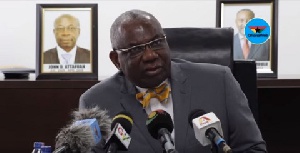 Boakye Agyarko, Energy Minister
Boakye Agyarko, Energy Minister
The Electricity Company of Ghana (ECG) which is valued at GHC14.4billion is grappling with GHC7.6billion liabilities as at the end of 2017.
According to the management accounts of the company, ECG made a loss of GHC796 million at the end of last year.
Information available indicates that ECG has been a loss making enterprise since 2011.
Owing to the poor balance sheet of ECG, the company is unable to raise the requisite investment capital to improve its infrastructure.
Turning around the fortunes of the state-owned power company is difficult because government is unable to secure the investments as it is limited under International Monetary Fund (IMF) conditions which limit the country’s borrowings.
ECG currently requires a minimum of $1billion investment in the short to medium term, representing between three and five years to resolve distribution problems and guarantee stable power to consumers.
The money would be invested to replace obsolete infrastructure, such as lines, transformers, substations, among others.
Government therefore, signed the Millennium Challenge Compact (MCC) II, under which the United States Government is to disburse a grant funding of up to $498,200,000 to implement a programme of activities in the electricity distribution sector, which includes Private Sector Participation (PSP) in electricity distribution as part of the power sector reform programme.
The funding from the US Government is to be disbursed in two tranches comprising $297 million in Tranche I and US$190 million in Tranche II.
Tranche II will be disbursed between the 3rd to 5th years subject to meeting all the Conditions Precedent (CP) including successful selection of an Acceptable PSP Provider to ECG.
The Government of Ghana is to provide direct counterpart funding of $37.36 million being no less than seven and one half percent (7.5%) of the amount of MCC Funding provided under the Compact.
In addition, it is estimated that tax exemptions over the 5-year Compact-term will be about $133.9 million.
About $300million of the amount would be invested in the ECG.
Newco to invest $580 million the first 5 years
Newco, the joint venture special purpose vehicle set up by Manila Electricity Company Limited (Meralco), the concessionaire, and Ghanaian investors, is to invest $580 million in the first five years, starting from January 2019, which is the start of the concession arrangements.
After this, the company is also expected to make additional investments as may be required during the entire duration of the concession which is 20 years.
Energy Minister, Boakye Agyarko, on Tuesday laid before Parliament a paper on a concession agreement to allow a consortium of investors to privately invest in the Electricity Company of Ghana (ECG).
The Paper has been referred to the Committee on Mines and Energy for consideration and report to the House.
The agreement has already been approved by Cabinet and awaiting parliamentary ratification.
When given backing by Parliament, Meralco, a power company from the Philippines, would lead a consortium in managing ECG for 20 years beginning 2019.
Mr Agyarko gave an assurance that ECG workers were going to keep their jobs.
The ECG would not be scrapped, but sublet power distribution to a company to be called Power Distribution Service Limited.
“ECG will still be ECG,” the Minister added.
The Minister praised the concession agreement and said, if such a deal had been made when Ghana began her energy sector reforms, the nation would not have gone through prolonged period of power shortages.
Justification for implementation of the ECG PSP
Reliable supply of electricity is critical for economic growth, job creation and enhancing the general welfare of the citizenry.
The distribution of electricity is a major component in the electricity value chain and is critical in achieving reliable supply of electricity.
It is worth noting that the people of Ghana had already initiated a power sector reform programme in 1997 in order to enhance the operational credibility of the sector as a whole.
The commitment to reforming the power sector of Ghana was intended, primarily, to introduce sweeping changes in the sector with the aim of bringing in increased private sector participation and investments in the whole value chain of the electricity supply industry.
The process included the transformation of the ECG from a corporation into a limited liability company and the creation of multiple concessions within the ECG jurisdictional area under private sector and also to allow retail competition.
These broad policy initiatives were encapsulated in the Energy Commission Act and the Public Utilities Regulatory Commission (PURC) Acts as well as the several legislative instruments passed by the Parliament of the Republic.